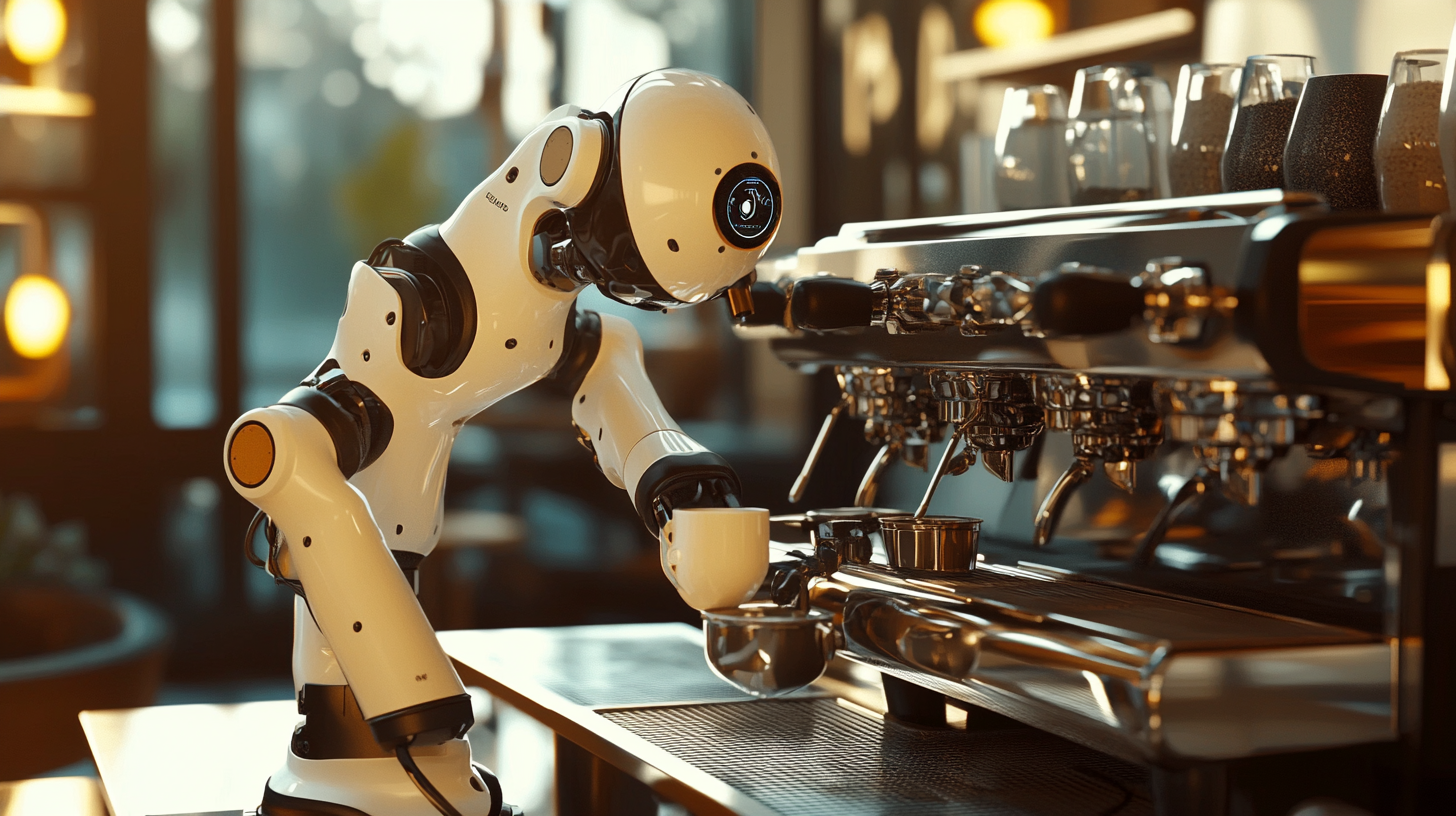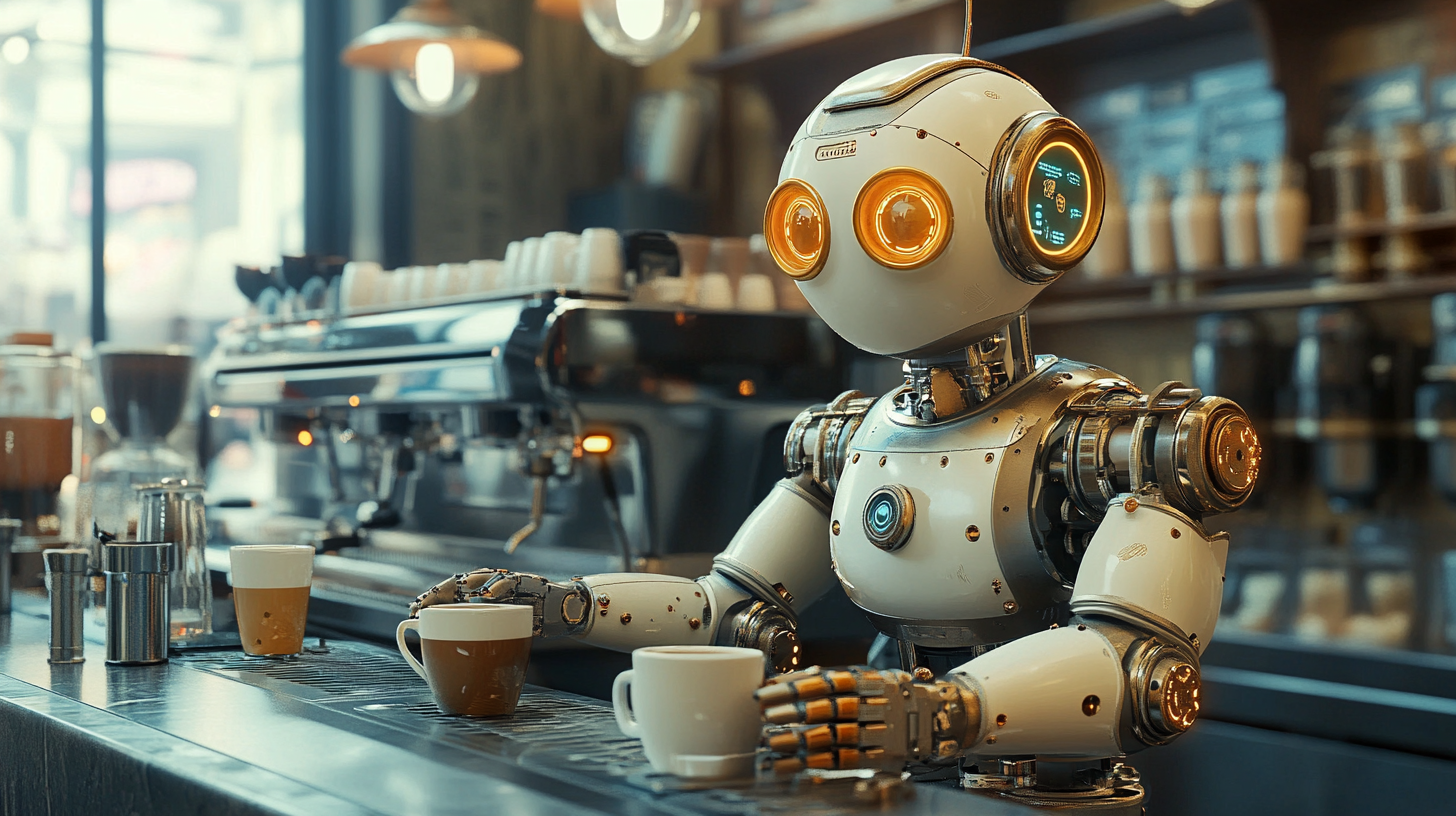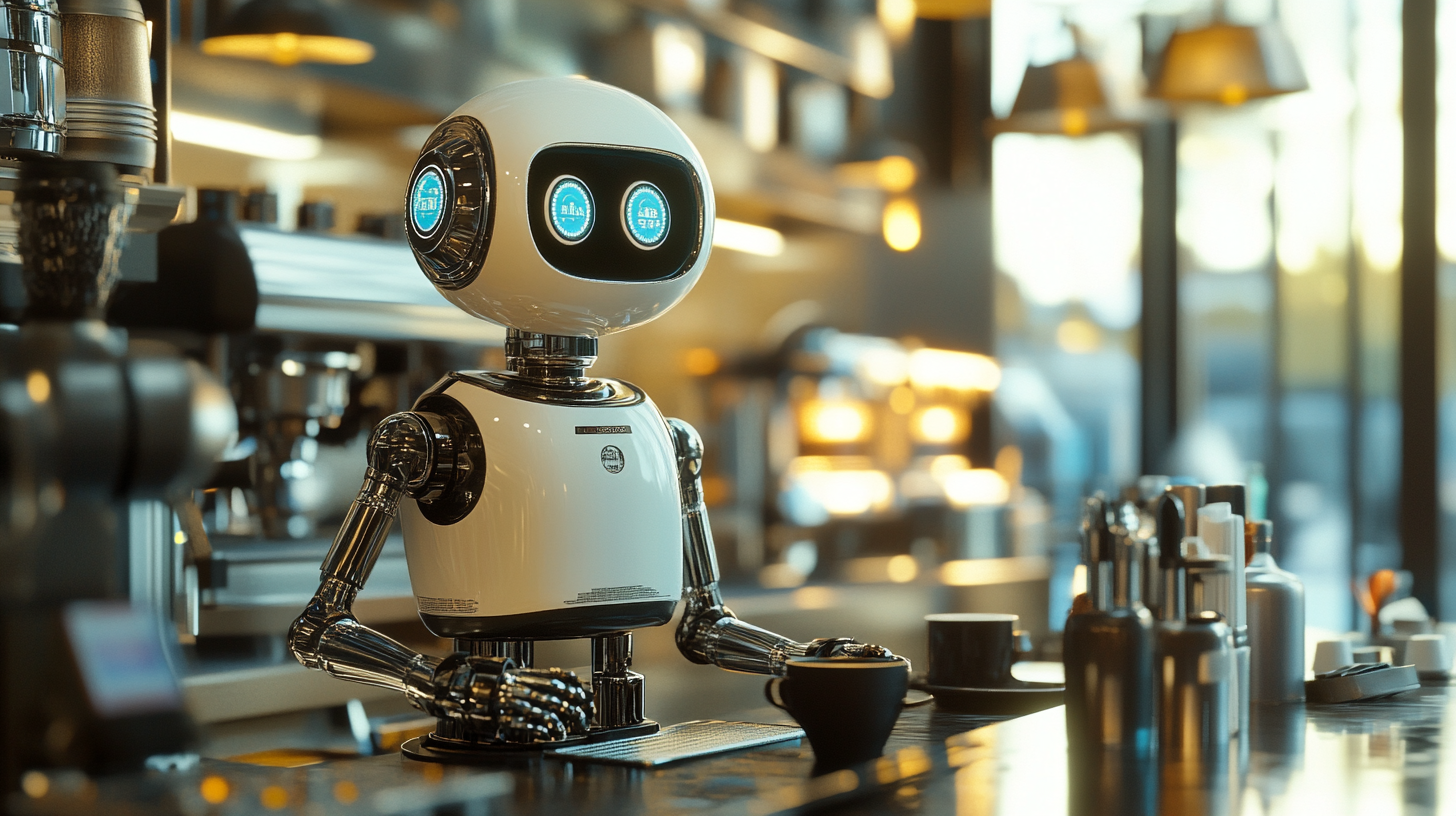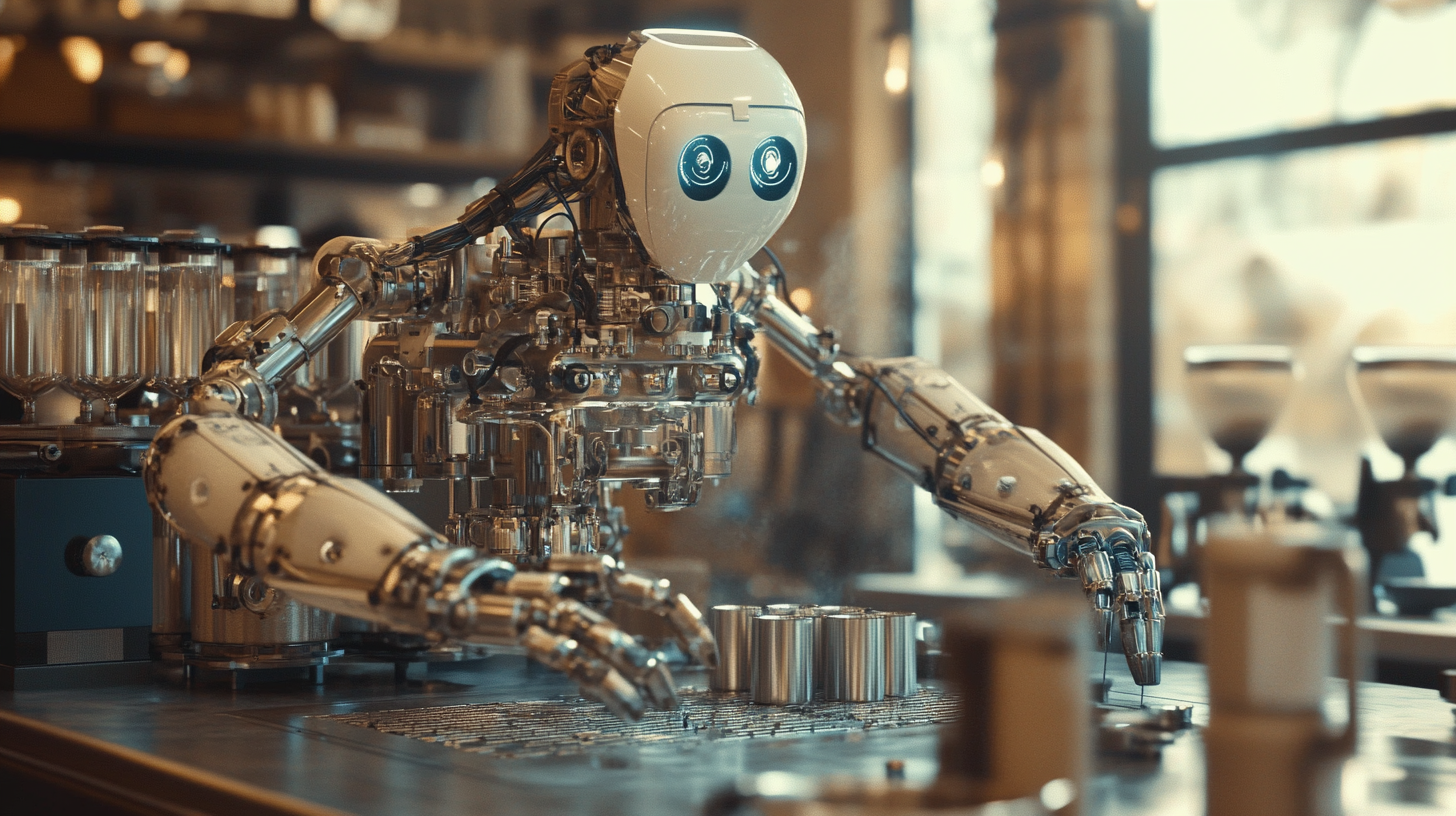Use it to plan your own robot barista payback period.

Want to know more details?
Please, contact your manager.
Aleksandr Maksimovich
Business Development Manager
Nalarobot Robotics | Nalarobot Café
Mobile: +375 333 760 460
(WhatsApp | Telegram | Viber)
BLOG
Unlocking Efficiency: Technical Specifications of Robot Baristas and How They Transform Coffee Service
Automated baristas: Changing the game of coffee service since a few sociable robots have come into view assisted by technology, which tanked the brewing system and hence promoted efficiency and consistency in the basic brewing procedures. The National Coffee Association puts it at around 60% of the American populace today drinks coffee daily, creating an insatiable demand for coffee with gimmickry. Robot Baristas catered to the idea of traditional cafés not keeping pace: machine precision for the sophisticated demands of coffee aficionados.
As a result, this bump in the $102.02 billion global coffee market by 2024 must ensure that automation holds a significant role in meeting consumer expectations concerning speed and quality. Whereas Robot Baristas cut down on staffing needs, they are also cutting down on human error, thus being touted as a USP in an ever-competitive market. By enabling less overseeing and greater quality service, these robotic systems are not novelty but represent the future of coffee service that chases unprecedented efficiency while reinventing our perception of coffee.

Overview of Robot Baristas: Revolutionizing the Coffee Industry
In the past few years, robot baristas has become a social force for change in the coffee industry activities-they just transform the traditional coffee service ways into unprecedented experience. These machines are high-tech carrying a fully automated brew of machines along with the craft. Both the coffee lover and even a business would find it a perfect solution that works seamlessly and efficiently for them. A closer immersion into the world of robot baristas, and you would realize that they are not just machines but new entrants into the industry that revolutionizes by efficiency and precision. Robotic baristas have very advanced technical specifications that contribute to their enhancing functions and performance level. Such machines work with artificial intelligence capabilities, enabling them to prepare coffee drinks in high volume and speed without compromising consistency in every beverage. In addition, these intelligent machines perceive and memorize the preferences of the customers based on their previous orders so that they can serve them with customized products. These machines made their presence felt at big events like the 31st Shanghai International Hotel and Catering Expo and were so much more than what became a household favorite, serving with its features now to ride the tide of intelligent manufacturing very much inspired by new information and consumer demand. Introduction of robot baristas into coffee shops or restaurants is showing a way through to automating things and reaching an efficient way in the very hotels and restaurants. That, too, makes coffee preparation sets free the way for other businesses to create the experience between the business and the customer in even higher dynamics of service within the place. Welcome this technological transformation into existence, and it is crystal clear as to where the future of coffee service is going-the way it does merge tradition with innovations in a delightful brew of possibilities.

Key Technical Features of Robot Baristas Enhancing Performance
Robot baristas have transformed the coffee serving business with advanced modern technology. Moreover, there are some essential technical characteristics that include a precision brewing system, metrics on real-time data, and interaction interfaces, which help in delivering optimal performance by the machine. Grand View Research, in a report published in 2023, states that the global automated coffee machine market will be worth $1.9 billion by 2028, representing considerable progress toward the involvement of robots in food service.
The most impressive aspect of robot baristas is their ability to keep brewing drink consistent and quality. These machines use advanced algorithms and sensors to make them capable of measuring and controlling key variables, such as brewing temperature, brew time, and ingredient ratio, very accurately. According to a study conducted by Specialty Coffee Association, customers value consistent flavor experiences 35% more than the inconsistent ones; and that's what robot baristas deliver. Through advancements in artificial intelligence, such machines may even count on taking in customer preferences over time to continually optimize the coffee-making process.
Most of these robots are also equipped with a user-friendly interface through which clients can easily customize their orders - a user experience enhancement that minimizes customer waiting time at peak periods. According to Marketwatch's reports, a restaurant using robotic solutions realizes up to 50% faster service speed. After the technology continues evolving, most probably they will launch mobile ordering and payments, thus maximizing the customer reachability of the robot barista in future coffee shops.

How Automation Streamlines Coffee Preparation and Service
From time to time, everything goes through an upheaval, and the infusion of automation has pervaded the coffee service space. This revolution is taking place especially with the advent of robot baristas. These state-of-the-art machines serve to ease the coffee-making process and expedite the journey of service in bustling cafes and coffee shops. The Allied Market Research report states that the global coffee market will reach $102.15 billion by 2026, identifying sputtering demand for a solution that meets tomorrow's meeting supply and quality requirement.
Automated coffee-making machines equipped with advanced brewing systems are cutting down on time taken, while maximizing consistency in flavour and quality. The National Coffee Association asserts that there is an increasing consumer demand for high-quality drinks that puts pressure on businesses to adopt solutions that deliver premium products quickly. While a human barista may handle maybe 2-3 drinks an hour, robot baristas take it to an unprecedented production level of 300 drinks an hour. Thus, coffee shops can serve more customers and increase revenue during peak hours.
More importantly, with automated coffee jobs, the coffee business will minimize labor costs, which also mitigates the workforce shortage the majority of establishments are currently facing, particularly the post-pandemic era. McKinsey's report states a well-calculated assertion that 20-40% labor cost-saving potential can be realized; thereby, allowing the business to redirect resources toward more value-adding activities that require fine dexterity and customer engagement. There is also value in enhancing the user experience, as technology is changing coffee service, allowing robot baristas to create personalized beverage options based on customer choices and preferences.

Impact of Robot Baristas on Customer Experience and Satisfaction
The introduction of robot baristas into the coffee service sector has had a significant effect on customer experience and satisfaction. According to a recently published report by the National Coffee Association, 67% of consumers show a willingness to embrace robotic service at cafes due to the novelty and technological advancement that such mechanisms bring. This enthusiasm for automation not only endorses the overall surliness of a coffee shop but also adds to a more lively experience for technology-interested customers.
Moreover, in addition to operational efficiency, robot baristas cannot be ignored. An article released by the International Journal of Hospitality Management said robotic systems can produce coffee speedier than the normal barista, even up to 20%. This efficiency not only cuts waiting time for the consumer but also provides an increase in customer satisfaction rates. For example, a survey from the Coffee Association says 82% of customers believe shorter waiting times improve the total experience enjoyed with coffee.
Moreover, robot baristas are incorporated for the tougher and more accurate tasks of adjusting brewing variables to specific individual preferences. Such individual customization has become increasingly necessary because today, almost all consumers demand personalized service. In fact, a survey conducted by Technomic claims that 75% of consumers will probably return to a café if it has tailored beverage options. Therefore, the capability of robot baristas to adapt to such requirements will not only be an added advantage in customer satisfaction, but will also contribute to brand loyalty in a high market competition.
Future Trends in Robotics and Coffee Service Innovations
The processes of ordering and serving coffee are poised for a major revolution through budding improvements in robotics and artificial intelligence. According to new reports, the market for robotic baristas will bloom rather quickly, going from $0.8 million in 2022 to $3.5 million within 2030, with a strong compound annual growth rate of 20.4% from 2024 to 2030. This kind of rapid expansion merely highlights the growing need for technological integration in coffee services to provide improved efficiency and effectiveness to businesses.
Not only is the innovation in robotic coffee-making enhancing speed and consistency of service, but also customer experience in general. Companies are using the latest technology to produce the best beverage while cutting down on waste and human error. For example, from the latest developments fully automated systems are employed providing the means to create tailor-made coffee drinks based on specifications from each person. These will go on to redefine customer interaction and operation efficiencies in cafes everywhere as they become more advanced.
In addition, one cannot understate the relevance of the current economic environment. While some industries are weighed down, robot baristas have emerged as a buoyant solution to what would otherwise spell doom for competitors. In pursuit of advanced technology and service efficiency, these companies are redefining standards for the coffee industry, taking on long-standing models and adapting to consumer needs. In summary, looking ahead, the future breaks bright with wonders where robotics and coffee service will serve as the mainstay.
